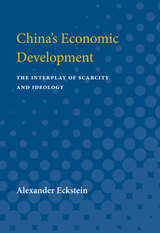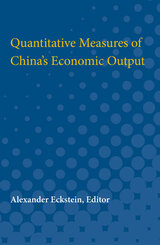2 books about Eckstein, Alexander

China's Economic Development
The Interplay of Scarcity and Ideology
Alexander Eckstein
University of Michigan Press, 1976
In this book, Alexander Eckstein turns his years of research and investigation to the task of exploring one of the most significant economic developments of the twentieth century: China's task of modernization and industrialization in the context of a socialist system. Eckstein asserts that China's economic development since 1949 can be best understood by centering it on the continuous confrontation of the country's Communist Ideology with its often harsh economic realities. Through analysis of this conflict, the tensions and its products, one might better understand how other countries might struggle—and whether they succeed or not—in developing as well. China's Economic Development is divided into six parts. Part I provides an overview of China's development problems, policies, and performance during the 1950’s and 60’s. Part II develops a framework for the analysis of scarcity and ideology, while Part III probes into China's economic heritage. Parts IV and V examine in turn the interplay of scarcity and ideology in conditioning China's development strategies, patterns of economic growth, and economic fluctuations since 1949.
[more]

Quantitative Measures of China's Economic Output
Alexander Eckstein, Editor
University of Michigan Press, 1980
The papers in this volume were among those presented at a Conference on the Quantitative Measures of China's Economic Output, held in January, 1975, at the Brookings Institution in Washington, D.C. The conference was sponsored by the Subcommittee on Research on the Chinese Economy of the Joint Committee on Contemporary China of the Social Science Research Council and the American Council of Learned Societies. Alexander Eckstein, from the University of Michigan, had been asked by the subcommittee to organize a meeting to bring together academics and government professionals carrying out research on China's economy to discuss common problems encountered in their research. Given the limited quantity and poor quality of basic economic data for China since 1949, Eckstein decided to organize the conference on the theme of reconciling quantitative estimates of China's economic output. Participants included some twenty academics from the United States, the United Kingdom, and India and fifteen professionals from government or quasi-public research institutions. The success of the conference led to urgings by the subcommittee and many other scholars that Eckstein edit several of the papers for publication. The revisions by the individual authors of the four essays included in this volume and the supervision and coordination of their efforts by Eckstein were time-consuming tasks. The authors worked closely with him in these efforts, and his detailed critiques and suggestions were planned as a separate volume. His contribution to the final version of the essays in this volume is very significant, but Eckstein suffered a fatal heart attack in December, 1976, before the revised draft of the fourth essay was completed and before he had begun to write the introductory essay. He was widely recognized as the dean of American scholars of the economy of China, and his death was a tragic loss for all students of China. Following Eckstein's death, Robert F. Dernberger of the Universit
[more]
READERS
Browse our collection.
PUBLISHERS
See BiblioVault's publisher services.
STUDENT SERVICES
Files for college accessibility offices.
UChicago Accessibility Resources
home | accessibility | search | about | contact us
BiblioVault ® 2001 - 2024
The University of Chicago Press









